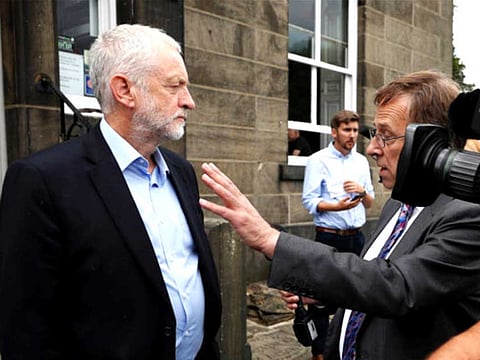Scottish independence is still relevant
The chances of Labour leader Corbyn finding a solution to the tangled problem of devolution are slim

Roughly five years ago, I cofounded the Radical Independence Campaign in Scotland. I knocked on thousands of doors, spoke at hundreds of meetings, and wrote columns for Scotland’s only pro-independence daily newspaper. But my values, like the values of radical independence, have always been socialist, not nationalist; and in the general election this June, I voted for Jeremy Corbyn’s Labour. It’s a decision that has provoked outrage among some fellow independence activists. I liked the Labour manifesto, but really it was Corbyn’s sense of rebellion and bravery that rang true to me, and many left-wing pro-independence voters in Scotland. Left-wing leaders tend to bend and, ultimately, break when they get close to power. Corbyn hasn’t. Others become distant, preening and authoritarian. He hasn’t done that either. Under pressure, he’s always put his principles first, and he’s been rewarded for it.
That’s why he’s possibly the most exciting thing happening on the European Left, and why a future election victory for him would inspire socialist activists across Europe. It would be the first simultaneous defeat of national chauvinism and the neoliberal austerity programme since Syriza’s breakthrough election victory in Greece in January 2015. This doesn’t change my position on Scottish independence. A Corbyn victory wouldn’t wholly solve the current crisis of British politics. Corbyn’s hard-core supporters tend to believe that simply commandeering the old British state and imposing a social democratic programme will be a simple thing, and that reforms will ease the bitterness. They are underestimating the challenges. Certainly, Corbyn’s social and economic reforms are badly needed. More than one in four Scottish children are growing up in poverty. Scottish politicians always greet these annual figures with talk of “combining growth and social justice”, and then drop the subject.
We need leaders like Corbyn, willing to break the taboo on higher taxes when the pressure is most intense. But power and democracy are different issues altogether, on which Corbyn’s Labour hasn’t made much impact. Maybe Scotland’s political crisis should be about poverty, but emotionally it’s still about respect, recognition and the complete collapse of New Labour’s devolution project. Brexit has brought this to the surface. It was meant to restore British sovereignty, but it has instead exposed all the cracks and crevices in the patch-up job of modernising the British state. Scotland’s parliament and Scottish opinion have been treated like wilful toddlers.
British Prime Minister Theresa May’s message is unambiguous: When the going gets tough, Holyrood is not treated as a serious representative of a nation. To the Tories, it’s little more than a petty community council. In retrospect, Scottish devolution was like a puppet show, where the magic works if you can suspend disbelief and ignore the strings. It just about functioned when the nationalists had no hope of power, and the Scottish executive of the day would loyally defer to London on important matters. Even some New Labour leaders, such as Henry McLeish, chafed at this, but most conceded that United Kingdom’s national interest came first, which explains why Labour members of Scottish parliament loyally turned out to vote for the Iraq war, even as many Westminster Labour MPs were risking their careers to vote against it.
Today, after 10 years of nationalist government, devolution is barely twitching. Holyrood is divided nearly 50-50 between “unionist” and “nationalist” blocs that simply try to score points against each other. Legislation in the year just gone was scant. The tone of Scottish politics combines bitterness and cynical mockery, and is becoming increasingly tribal. Northern Ireland faces a similar, but even worse, impasse, because one faction has been moved in to shore up May’s government. With this one manoeuvre, she has undermined a generation of trust-building.
Last year’s European referendum brought these issues into the open. As an internationalist who speaks regularly with Greek and Spanish activists, I am sceptical of the EU, like the third of outright Scottish nationalists who are Euro-sceptic. But Brexit has simply exposed the real status of the devolved parliaments as useful but extremely dispensable chess pieces.
The problems go back decades. On the big international issues that concern Scotland, the Scottish parliament’s views are barely even registered in official documents. Scotland becomes a dumping site for nuclear missiles or, given its high unemployment, a recruitment opportunity for the British armed forces. Welfare reforms are imposed against the Scottish political consensus.
While some of these decisions can be reversed, the hurt and disenchantment caused in the process cannot be easily withdrawn. Corbyn has inspired activists across Europe. Whenever I speak to socialists abroad, they ask me what I’m doing to get Corbyn elected. The chances of Corbyn finding a solution to the tangled problem of devolution are slim. Getting the pro-independence movement to find inspiration from Corbyn is difficult, given the prevailing tribalism, but the chances are greater. And if one day soon Scotland is negotiating its independence, I know who I’d prefer on the other side of the table. That’s why, I’m standing in the middle of two-way traffic, as a pro-independence Corbyn supporter. Have no doubt, there are thousands of others like me.
— Guardian News & Media Ltd
Cat Boyd is co-founder of the Radical Independence Campaign in Scotland, and was a prominent activist in the Scottish independence referendum in 2014.


